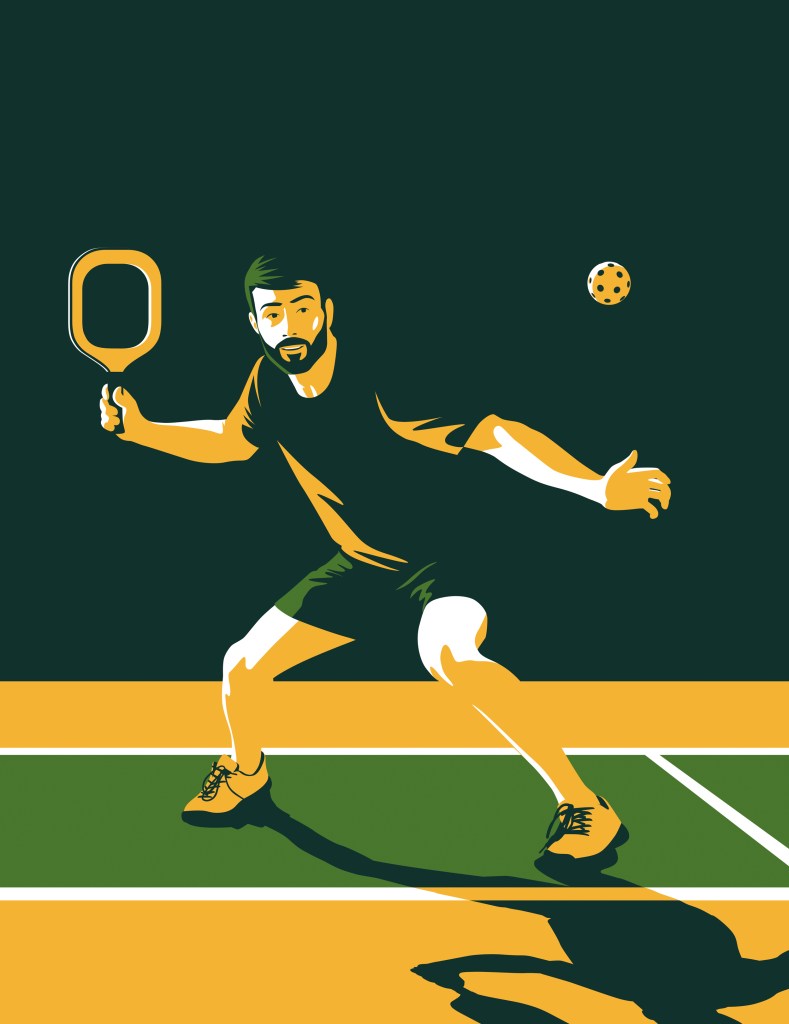What’s Your Pickleball Weakness?
inpickleballme
on
August 12, 2022

WHAT’S YOUR
PICKLEBALL
WEAKNESS?
Reveal your vulnerability and boost your game with insight and tips from renowned pickleball instructor Rommie Maxey.


1. HOW LONG HAVE YOU BEEN PLAYING?
A) Just started!
B) You’ve been hitting the court for a year or so
C) You and pickleball go waaay back
2. AFTER MAKING A SHOT, YOUR PADDLE’S:
A) Dangling down below your waist
B) Gripped super tightly in your hand
C) Who knows? You’re too busy obsessing over your opponent’s next move
3. YOUR CONTACT POINT (WHERE YOU HIT THE BALL WITH YOUR PADDLE) IS USUALLY:
A) Different with every swing
B) Pretty far behind your body
C) In front of your body, but you adjust based on what your opponent is doing
4. UGH, YOU JUST MADE A MAJOR FLUB ON THE COURT. WHAT RUNS THROUGH YOUR HEAD?
A) Not much—you’re just trying to catch your breath
B) Hmm, why didn’t the ball go where I wanted it to?
C) You analyze exactly what happened and why
5. THE NIGHT BEFORE YOU PLAY, YOU:
A) Relax—maybe even stay out late with friends
B) Strategize how you’re going to return serves hard and fast
C) Make a list of mistakes you’ve made in past matches to remind yourself what not to do
6. CONGRATS! YOU’VE FOUND A SETUP THAT SEEMS TO WORK AND SCORE YOU A POINT. SO YOU:
A) Wait, back up. You’ve never actually noticed a point-friendly pattern like that
B) Try to re-create it, but have a hard time doing the exact same thing again
C) Repeat it over and over and over in all the games you play
7. HOW OFTEN DO YOU PLAY PICKLEBALL?
A) Occasionally
B) It’s pretty inconsistent—you’ll go for months without playing, then play tons
C) All. The. Time.
8. AFTER A MATCH, YOU:
A) Need a nap
B) Are frustrated your shots weren’t as precise as you’d have liked
C) Keep replaying the game over and over in your head
MOSTLY A’s:
Build Your Stamina
You start off strong, but by the end of a match you don’t have much pep left in your step—which can lead to mistakes. To increase stamina, hit the court more often, says Rommie Maxey, a pickleball instructor in Houston, Texas. And try cross-training. On days you don’t play, head to the gym for some light cardio and weight lifting that targets the muscles you need most in pickleball. (Try our Peak Performance exercises on page 40—they can add power to your legs so you can move around the court with ease.) Another tip: Dehydration can cause stamina issues. “Drinking water is important—not just during and after play, but also in the days leading up,” Maxey says.
MOSTLY B’s:
Hone Your Technique
“The people I work with most can play decently but have picked up bad habits or aren’t using the proper technique,” says Maxey. One common pitfall? Mishandling your paddle. You want a light, loose hold. Gripping it too hard will result in dinks or drops going too far and too high. Letting your paddle dangle down by your side after a shot means you’re not ready for a fast return. To figure out what technique you need to work on, Maxey suggests recording your game. “Watch it back and you may notice certain habits and behaviors—like not getting your paddle back in a good position—that you can then address for future games,” he says.
MOSTLY C’s:
Change Your Perspective
“If you’re tense, feel anxious, or insecure when you play, it’s a sign you need to work on the mental aspect of your game,” says Maxey. When you’re so obsessed with what your opponent is doing that you forget what you’re doing, or let nerves bungle your next move, Maxey says a simple mindset shift can help. “Some people play to win, while others play not to lose,” he says. “If you’re so focused on avoiding losing, you’re in a more reactive state and are missing a lot of opportunities to take control of the game.” Another hazard is sticking to moves that have worked for you in the past—or avoiding moves that haven’t. “You have to have the fortitude to try new things,” says Maxey. “It’s the only way to grow and evolve as a player.”
- Category: Articles, GAME ON, Quiz
- Tag: #gameon, Inpickleball, Pickleball, Pickleballweakness, Quiz

